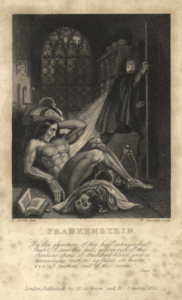This post was originally published in “Download the Universe,” a multi-author blog about science ebooks edited by Carl Zimmer.
Frankenstein: The Afterlife of Shelley’s Circle. Published by The New York Public Library.
Reviewed by Carl Zimmer
June 8, 2012

“Reviewed” is too generous a term for this post. If I set out to write a proper review this colossal labyrinth of an ebook, you would have to wait for weeks, perhaps months, for my verdict. But since this particular work is free, I think the most that’s necessary is to point you in its direction and wish you well. I downloaded Frankenstein this morning, and I’ve been enjoying perusing it greatly. While it’s not a perfect ebook, I expect I’ll be delving back into it for a long while.
Frankenstein comes to us from the New York Public Library. If you’ve ever been there, you’ve probably seen one of their impressive exhibits. As one of the greatest libraries in the world, the New York Public Library is also a great literary museum. To put on an exhibit, they will typically select some of the finest treasures from their collections, such as rare books, letters, maps, and prints. Frankenstein is like an exploded version of one of their exhibits. It’s drawn from the Carl H. Pforzheimer Collection of Shelley and His Circle. As I wandered through the app, I sometimes wonder if there was anything in the collection that they didn’t include in it.
At the core of this ebook is Mary Shelley’s classic meditation on science and humanity’s urge towards creation. Here you can listen to a dramatic reading from one chapter. The ebook contains accounts of the making of novel, as well as its reception. Essayists contemplate the powerful hold the story has had on us ever since, and how we’ve adapted its themes to science’s progress, from the advent of nuclear weapons to our age of stem cell manipulations and genetic engineering. The whole project is lavishly illustrated with paintings and photographs.
This morning on the ArtsBeat blog at the New York Times, Jennifer Schuessler wrote that “the app spins out widely and wildly.” I have to agree with her. I found myself paging through stills from a disastrous 1981 Broadway production of Frankenstein that closed after one night, and asked myself, “Why am I looking at this?” I can’t say that the experience gave me any insight into the book’s place in our culture. The essays on Shelley’s circle of friends veer off far from her novel. The app includes not one but two graphic novels. Frankenstein is also loaded with interactive features, which are nicely integrated technologicaly, but not thematically. While reading the piece on the making of the novel, you are invited to pop out a poll: “Do you get the most inspiration from creating on your own?” Why, yes I do! The app then informed me that 84% of the 13 people who voted agree with me. How ’bout them apples?
The ebook also has some technical flaws. I’m still clinging to my iPad 1, and I find that Frankenstein slows down its performance like no other ebook I’ve used. On more than one occasion, it even crashed. Which is odd, given that Frankenstein deals mainly in texts and pictures, which should make pretty modest demands on a tablet device. On top of the app’s slow performance, it displays its essays in small windows that you have to scroll through, which took me back to the early days of the web. Sometimes when you follow a link, the app dumps you into the web-site version, as if you’ve fallen into a parallel universe.
If you find yourself annoyed by anything in Frankenstein, bear two things in mind. 1. It’s free. 2. One touch of the screen will quickly take you to a different part of the app. Any time I’ve gotten bored by something in Frankenstein, I’ve found myself intrigued seconds later by one of the hundreds of elements of this app.
Perhaps that’s the true sign of the greatness of Shelley’s novel. The book was a Big Bang, and the universe it created is still expanding.
 Carl Zimmer writes frequently about science for the New York Times and is the author of 13 books, including A Planet of Viruses.
Carl Zimmer writes frequently about science for the New York Times and is the author of 13 books, including A Planet of Viruses.